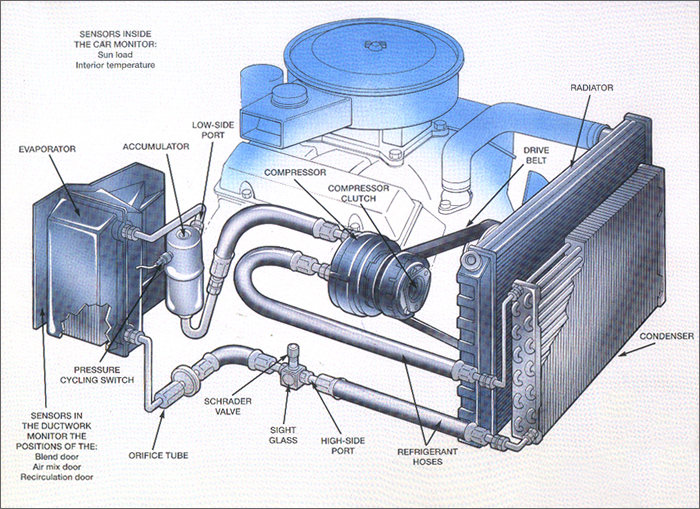Decoding Your Car's AC: The Condenser Explained
Ever hopped into a sweltering car on a scorching summer day and breathed a sigh of relief as the AC kicked in? That blissful rush of cool air is thanks to a network of components working in harmony, and the car's air conditioning condenser plays a starring role. But what exactly *is* a car air conditioning condenser, and why should you care about it?
Think of your car's AC as a miniature refrigerator. The condenser is like the radiator at the back of your fridge – it's responsible for releasing heat. It transforms the hot, high-pressure refrigerant gas from the compressor into a cooler, high-pressure liquid, a critical step in the cooling cycle. Without a properly functioning condenser, your car AC system simply won't be able to chill the air effectively.
Understanding how this essential component operates can empower you to maintain it properly, troubleshoot potential problems, and ensure you stay comfortable behind the wheel, no matter the weather. This article will delve into everything you need to know about the car air conditioning condenser – from its inner workings to common issues and maintenance tips.
Imagine a hot summer road trip without a functioning AC. It's not a pleasant picture, is it? The car AC condenser is a crucial part of what makes those long drives bearable, particularly in warmer climates. It ensures the refrigerant, the lifeblood of your cooling system, can effectively absorb and dissipate heat, keeping the cabin comfortable and preventing you from overheating.
While the exact origin of the automotive air conditioning condenser is intertwined with the overall development of car AC systems in the early 20th century, its fundamental operating principles remain the same. Initially a luxury feature, car AC has become a standard expectation, highlighting the importance of understanding its core components, including the condenser.
The car AC condenser works by using a network of thin tubes and fins. The hot, high-pressure refrigerant gas from the compressor enters these tubes. As the gas travels through the condenser, the surrounding air, flowing over the fins, absorbs the heat, causing the refrigerant to condense into a high-pressure liquid. This cooled liquid then moves to the receiver-drier and expansion valve, continuing the cooling cycle.
One of the most common issues with a car air conditioning condenser is leakage. This can be caused by damage from road debris, corrosion, or wear and tear. Another frequent problem is blockage, which restricts refrigerant flow and reduces cooling efficiency. Regular inspections can help identify these problems early.
Benefits of a Functioning Car AC Condenser:
1. Comfortable Driving Experience: A functioning condenser ensures a cool and comfortable cabin, especially during hot weather, reducing driver fatigue and improving overall comfort.
2. Improved Air Quality: The AC system, including the condenser, helps filter out dust, pollen, and other airborne particles, improving the air quality inside the vehicle.
3. Preventing Overheating: In extreme heat, a functioning AC can help prevent overheating, particularly for vulnerable passengers like children and the elderly.
Advantages and Disadvantages of a Typical Car AC Condenser
| Advantages | Disadvantages |
|---|---|
| Provides efficient cooling | Susceptible to damage from road debris |
| Relatively compact and easy to integrate into the vehicle's design | Can leak refrigerant, which is harmful to the environment |
| Durable and can last for many years with proper maintenance | Can be expensive to replace |
Frequently Asked Questions:
1. What does a car AC condenser do? It cools down the refrigerant, changing it from a gas to a liquid.
2. Where is the condenser located? Typically at the front of the vehicle, behind the grille.
3. How do I know if my condenser is faulty? Signs include poor cooling performance, warm air from the vents, or unusual noises.
4. Can I clean my car AC condenser myself? Yes, carefully cleaning the fins with a fin comb and gentle water pressure can help improve efficiency.
5. How much does it cost to replace a car AC condenser? Costs vary, but expect to pay several hundred dollars.
6. How often should I check my condenser? Visually inspect it at least once a year, preferably during routine maintenance.
7. Can I drive with a faulty condenser? It's not recommended, as it can strain the entire AC system.
8. What causes condenser leaks? Damage from debris, corrosion, and age are common causes.
Tips and Tricks: Regularly inspect your condenser for leaks or damage. Keep the area around the condenser clear of debris. Have your AC system professionally serviced at least every two years.
In conclusion, the car air conditioning condenser is a critical component for maintaining a comfortable cabin temperature, especially during hot weather. Understanding its function, identifying potential problems, and performing regular maintenance will ensure its longevity and keep your car cool and comfortable for years to come. Taking proactive steps to care for your condenser is an investment in both your comfort and the overall health of your vehicle's AC system. Don't underestimate the importance of this small but mighty component – it truly makes a difference in your driving experience. By understanding how it works and staying on top of maintenance, you can enjoy countless cool and comfortable journeys, no matter how high the temperature climbs. A properly functioning AC system enhances not only comfort but also safety, allowing you to stay focused and alert on the road, especially during long drives. So, take the time to familiarize yourself with your car’s AC condenser – it's a small effort that pays off big in the long run.
Road ready tire inflator jump starters and peace of mind
Heartfelt fathers day poems for kids
Unlocking the secrets of 4x4 bolt pattern rims your guide to elevated adventures










.jpg)



